Minimum Hardware Requirements
Processor: Processor that supports Virtualization
Memory: 2GB RAM
Recommended Hardware Configuration
Processor: Processor that supports Virtualization
Memory: 2GB of RAM or Higher
System BIOS Requirements
The system BIOS must support virtualization technology in addition to the processor
having the feature for it to function.
By default, the HP system BIOS disables the virtualization support of processors.
Virtualization must be enabled for Windows XP Mode to function.
Virtualization Varieties
There are two kinds of Virtualization Technology:
•
Processor-based VT with VMM support
Chipset-based VT with directed I/O
•
The processor-based VT is common across both Intel and AMD processors. Intel VTx
and AMD-V both deal with virtualization at the processor level and are designed to
assist software virtualization.
The chipset-based VT is currently only available with higher-end Intel processors
and chipsets. Intel VTd (Directed I/O) is an extension of VTx and provides the
capability to control DMA accesses and direct them to specific domains which are
regions in physical memory. This will allow better performance for peripheral
devices that take advantage of the feature.
Intel VTd is offered in Intel vPro systems. VTd is not required for Microsoft Virtual PC
to execute, but it could improve performance.
HP System BIOS
HP systems (dc7xxx, dc5xxx, Elite 600x Pro, and others) that use an HP system
BIOS can access the virtualization option as follows.
VTx and AMD-V systems
Do the following to enable processor virtualization in VTx and AMD-V systems:
1. Turn on or restart the computer.
2. As soon as the computer is turned on, press F10 when the monitor light turns
green to enter Computer Setup. Press Enter to bypass the title screen, if
necessary.
3

